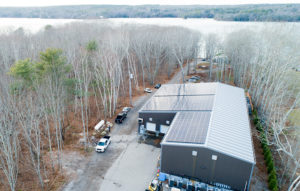Impact
Maine’s island and coastal communities are at the forefront of implementing integrated climate change mitigation and adaptation measures.

Learn more about the Island Institute’s work to decarbonize Maine’s working waterfronts and our ocean acidification research that shows the role of kelp in sequestering CO2.
Goal
45% decrease in greenhouse gas emissions from 1990 levels to 11.67 MMTCO2E
Year
2030
Measurement
Many states in the U.S. measure greenhouse gas (GHG) emissions, so it is a standardized way to show the effect of the implemented mitigation and adaptation measures across state lines with different policies and standards in place. Climate change is driven by GHG emissions, and these are notoriously difficult to track in small geographies due to the nature of gas to spread beyond the boundary of emission. For this reason, this metric must rely on a state dataset that captures the outputs from the complex relationship between the islands and the coast and the rest of the state.
State of Maine Annual Greenhouse Gas Emissions
To read the executive summary of the biennial greenhouse gas emissions report from the Maine Department of Environmental Protection, click here. Click here to read the full report.

